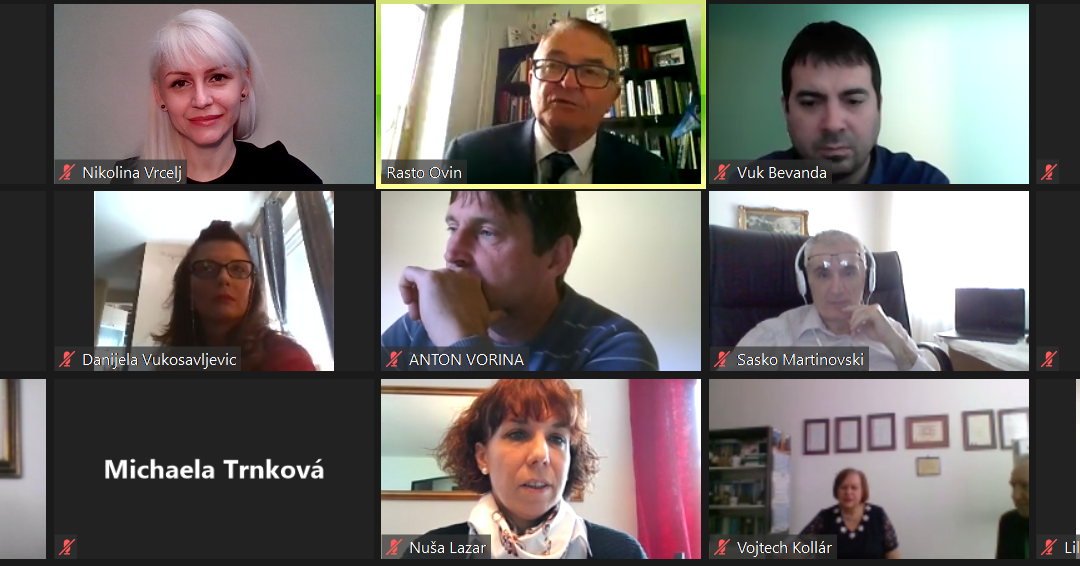Digital Methods of Education and the Level of Students’ Knowledge in Mathematics
Vladimír Matušek – Slovak University of Agriculture in Nitra, Tr. A. Hlinku 2, 949 76 Nitra, Slovak Republic
Dana Országhová – Slovak University of Agriculture in Nitra, Tr. A. Hlinku 2, 949 76 Nitra, Slovak Republic
Mária Farkašová – Slovak University of Agriculture in Nitra, Tr. A. Hlinku 2, 949 76 Nitra, Slovak Republic
Radomíra Hornyák Gregáňová – Slovak University of Agriculture in Nitra, Tr. A. Hlinku 2, 949 76 Nitra, Slovak Republic
7th International Scientific ERAZ Conference – ERAZ 2021 – Selected Papers: KNOWLEDGE BASED SUSTAINABLE DEVELOPMENT, Online/virtual, May 27, 2021
ERAZ Conference Selected Papers are published by: Association of Economists and Managers of the Balkans – Belgrade, Serbia
ERAZ conference partners: Faculty of Economics and Business, Mediterranean University, Montenegro; University of National and World Economy – Sofia, Bulgaria; Faculty of Commercial and Business Studies – Celje, Slovenia; AMBIS University, Prague – Czech Republic; Faculty of Applied Management, Economics and Finance – Belgrade, Serbia
ERAZ Conference 2021 Selected Papers ISBN 978-86-80194-47-9, ISSN 2683-5568, DOI: https://doi.org/10.31410/ERAZ.S.P.2021
Keywords:
Digital methods of education;
Distance learning;
Mathematics teaching;
Knowledge evaluation;
Z-test
Abstract: The global pandemic caused by the COVID-19 disease significantly affected higher education in 2020 and resulted in the transition from full-time to distance learning. The question here is the effectiveness of the implementation of new methods of online teaching and learning in relation to the quality of students’ knowledge. The main goal is to analyze the mathematical knowledge and skills of students and compare the study results in Mathematics in the academic years 2018-2020 in the context of full-time teaching versus online teaching. The paper also points at the possibilities of teaching and studying mathematics using various tools and methods of digital education, e.g. LMS MOODLE, MS TEAMS and MS FORMS. The research sample consisted of students of the Faculty of Engineering and research data were retrieved from prelim tests, exam tests and final grades in mathematics exams and then were analyzed by selected methods of quantitative and qualitative research.

ERAZ Conference
Creative Commons Non Commercial CC BY-NC: This article is distributed under the terms of the Creative Commons Attribution-Non-Commercial 4.0 License (https://creativecommons.org/licenses/by-nc/4.0/) which permits non-commercial use, reproduction and distribution of the work without further permission.

References
Borba, M.C., Askar, P., Engelbrecht, J., Gadanidis, G., Llinares, S., & Aguilar, M.S. (2017). Digital Technology in Mathematics Education: Research over the Last Decade. In Kaiser G. (eds) Proceedings of the 13th International Congress on Mathematical Education. ICME- 13 Monographs. Springer, Cham. https://doi.org/10.1007/978-3-319-62597-3_14
D’Ambrosio, U., & Borba, M. C. (2010). Dynamics of change of mathematics education in Brazil and a scenario of current research. ZDM – The International Journal on Mathematics Education, 42(3), pp. 271–279. doi: 10.1007/s11858-010-0261-x
Drábeková, J., Pechočiak, T., & Matušek, V. (2018). Mathematical competencies of students entering university studies. Case study of Slovakia. Mathematics in education, research and applications. 4, 1 (2018), pp. 23-30. https://doi.org/10.15414/meraa.2018.04.01.23-30
Drijvers, P. (2015). Digital Technology in Mathematics Education: Why It Works (Or Doesn’t). In Cho S. (eds) Selected Regular Lectures from the 12th International Congress on Mathematical Education. Springer, Cham. https://doi.org/10.1007/978-3-319-17187-6_8
Horská, E., Ubrežiová, I., & Palková, Z. (2015). Quality and value related aspects of the higher education: a case of the Slovak University of Agriculture in Nitra. In Development of Public Accreditation of Agricultural programs in Russia (PACAgro) (543902-TEMPUS-1- 2013-1-SK-TEMPUS-SMGR), pp. 123-133. Saint-Petersburg: Saint-Petersburg State Agrarian University. http://spbgau.ru/files/nid/3515/sbornik_tempus_2015.pdf
Hudáková, J., & Papcunová, V. (2020). Impact of Activating Teaching Methods on Results of the Students. In 5th International Conference on Education Science and Development (ICESD 2020). (pp. 511-516). Lancaster: DEStech publications. DOI: 10.12783/dtssehs/icesd2020/34123
Košovská, I., Pietriková, M., & Váryová, I. (2020). The assessment of students› achievements from the subject Basics of Accounting in the study program Accounting at FEM SUA in Nitra. Mathematics in education, research and applications. 6, 2 (2020), pp. 64-71. https:// doi.org/10.15414/meraa.2020.06.02.67-71
Matejková, E., Pietriková, M., & Poláková, Z. (2013). Practice in Statistics. Nitra, Slovakia: Slovak University of Agriculture
Moreno-Guerrero, A.-J.; Aznar-Díaz, I.; Cáceres-Reche, P., & Alonso-García, S. (2020). E-Learning in the Teaching of Mathematics: An Educational Experience in Adult High School. Mathematics 2020, 8, 840. https://doi.org/10.3390/math8050840
Pechočiak, T. (2020). Education of mathematics during the coronavirus crisis. Mathematics in
education, research and applications. 6 , 2 ( 2020), p p. 4 7-53. h ttps://doi.org/10.15414/meraa.2020.06.02.47-53
Pechočiak, T., & Kecskés, N. (2016). Mathematics and statistics in global education. In The agri-food value chain: challenges for natural resources management and society, (pp. 668-674). Nitra: Slovak University of Agriculture. http://dx.doi.org/10.15414/isd2016.s8.13
Rumanová, L., & Drábeková, J. (2019). Visual understanding of problem and pictures’ occurrence in educational process. TEM JOURNAL – technology, education, management, informatics. 8, 1, pp. 222-227. DOI: 10.18421/TEM81-31
Sánchez-Guerrero, L., Figueroa-González, J., González-Beltrán, B., González-Brambila, S., Pulido-Rodríguez, G., & López-Bautista, R. (2019). Analysis of the progress of engineering students when they do not approve mathematics courses. In ICERI2019 Proceedings, (pp. 3366-3372). Valencia: IATED. http://dx.doi.org/10.21125/iceri.2019.086

